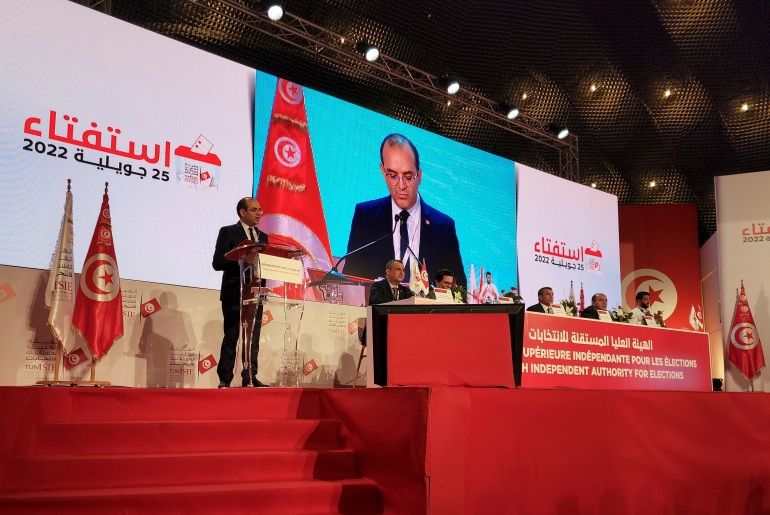
‘Yes’ vote wins Tunisia landslide, but critics question support
Results show that Tunisians have voted to approve a new constitution proposed by President Kais Saied, but the country’s opposition says the low turnout of only about 30 percent shows the president’s weakness and the illegitimacy of the process.
According to preliminary results announced by the Tunisian Independent Higher Election Authority (ISIE) on Tuesday evening, 94.6 percent of voters approved the constitution.
A monthlong appeal process will now be held before the final result is announced at the August end.
The low turnout came amid a boycott campaign from the Tunisian opposition, which says the new constitution will potentially lead Tunisia back to one-man rule, as it changes the country from a hybrid parliamentary system to a hyper-presidential one, and removes a number of checks and balances.
Farouk Bouasker, the head of the ISIE, steered away from discussing voter turnout after many members of the opposition emphasised that the majority of Tunisians not only did not vote for Saied, but they also did not engage in his referendum process.
 ISIE President Farouk Bouasker announces the preliminary results of the
referendum on a new constitution in Tunis, Tunisia, July 26, 2022
ISIE President Farouk Bouasker announces the preliminary results of the
referendum on a new constitution in Tunis, Tunisia, July 26, 2022
Saied, who said on Monday that people were free to skip the referendum, insisted the new document will keep the freedoms enshrined in the 2014 iteration of the constitution, adding his changes are necessary to weaken a “corrupt” political elite.
The populist, who came into power in 2019, retains a strong support base from Tunisians tired of the economic and political crises that have dominated the country since the 2011 revolution, but has lost support since he suspended parliament and dissolved the government last July.
Saied will continue to be able to rule by decree until parliamentary elections are held in December.
Concerns and questions
In a news conference, Nejib Chebbi, a leading member of the opposition National Salvation Front, said low turnout “de-legitimises the overall process”.
His comments were echoed by the founder of the US-based Center for Research of Islam and Democracy, Radwan Masmoudi.
“You can’t approve or adopt a new constitution with less than 30 percent of the voters,” he told Al Jazeera. “In reality, the numbers are far smaller, but the ISIE was under his [Saied’s] control, especially in the interior of the country, and rigged the results in his favour as was expected.”
Questions have abounded about how accurate the results and the official turnout are, particularly as few election observers have been present.
Internationally, the reaction to the referendum has been muted.
US Department of State spokesman Ned Price said Washington was aware of concerns among civil society organisations and politicians about the lack of an “inclusive and transparent process and the limited scope for genuine public debate during the drafting of the new constitution”.
He added: “We also note concerns that the new constitution includes weakened checks and balances that could compromise the protection of human rights and fundamental freedoms.”
Support for Saied
Polls have repeatedly shown that despite a sharp drop in Saied’s approval rating, he would still be the most popular presidential candidate if an election were to be called.
“It’s not that Saied is popular it’s just that he is politically stronger than the others,” political author Amine Snoussi told Al Jazeera. “That means that there is a political space for other actors to install and profit from.”
The voters Al Jazeera spoke to at polling stations before the count said their biggest concern was the future of their children or grandchildren. Many have high expectations, and they hope that Saied will make drastic changes to the country.
But Snoussi fears what might happen now that Saied has all the powers of the state in his hands.
“I think he is going to rule just as he ruled for the last year, but now he has the law with him, now he has every tool he needs to install an authoritarian regime,” he explained.











